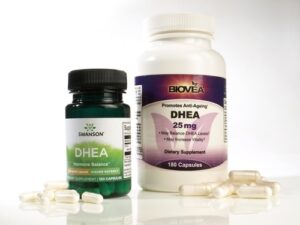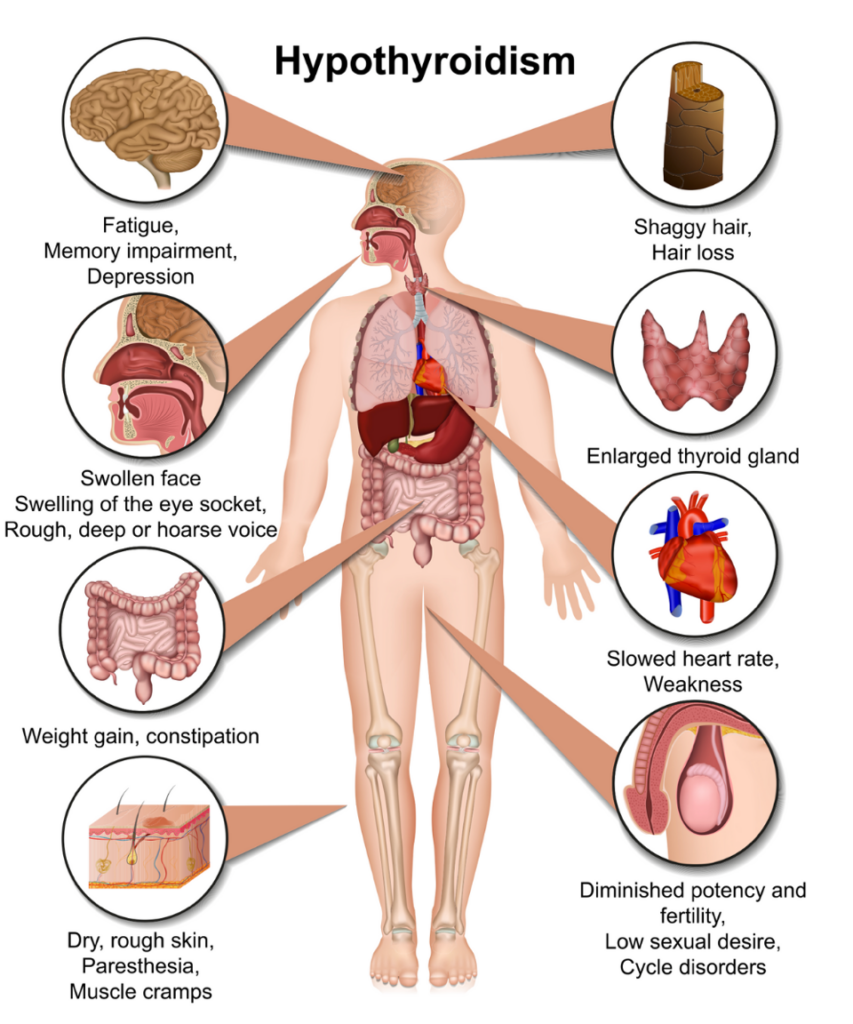What's On This Page?
ToggleFertility is a gift in life! Having a baby (which depends on DHEA levels) is such an incredible gift for you and your family, one that many couples take for granted until a problem conceiving occurs. Infertility is becoming widespread these days but in the early 1900’s, families with five children or more were commonplace. A century later, we now have fertility clinics available to women who want to just have one child.
Infertility treatment is expensive and painful for couples who often become desperate after years of failed treatments. One common overlooked reason is low DHEA levels.
DHEA is short for DeHydroEpiAndrosterone.
This is the “fountain of youth” hormone and it’s a natural adrenal hormone which peaks at age 25, then steadily declines as we age. DHEA can be converted into testosterone and estrogen. Lower levels means less of these sex hormones. Blood or saliva tests are available to gauge your levels which must be in balance with other adrenal hormones, especially cortisol. High cortisol will cause you to hold on to belly fat.
Cortisol goes up in response to stress. Remember, these two are supposed to be in balance, like a see-saw. So you can see where I’m going with this. Cortisol climbs up and up in many women given the fast-paced 21st century non-stop information overload, lack of sleep, caffeine, work-related stress, financial obligations or relationship stress.
When it comes time to have a baby (READ THIS ARTICLE) cortisol could be high while DHEA levels may be seriously tanked! Some signs and symptoms include bad PMS (premenstrual syndrome), fatigue, brain fog, mood swings or high cholesterol.

Hold on, did your fertility doctor mention you have a low egg count? That’s likely due to something called “Low Functional Ovarian Reserve” or LFOR, a common issue as our ovaries age. P
icture this: when you hit puberty, you’re packed with about 250,000 to 500,000 eggs, but by the time you’re 37, this number might dwindle to around 25,000. And by menopause? You could be down to less than 1,000 eggs.
It’s a natural part of aging, but knowing this helps us understand and manage our reproductive health better, especially if you’re considering options like IVF. Let’s not just count our eggs before they hatch—let’s make sure they’re nurtured right!
LFOR and Research
If you have LFOR, a specialist in this field will often complement in-vitro fertilization (IVF) with DHEA supplements and/or testosterone medications. According to a recent study published in the Journal of Ovarian Research research supports it. Female participants received 75 mg for 3 consecutive menstrual cycles prior to IVF experiences.
Those who received DHEA had more embryos leading to more successful pregnancies. But don’t do it by yourself, dosing is dependent on many factors, especially genes which I study every day. There are many factors involved in getting pregnant such as timing. Your OB/GYN can share more with you about timing, and how your basal body temperature fluctuates with your cycle… and when the best time is to get pregnant. I have this graphic for you which is the female menstrual cycle and it shows the ovulation process and hormone levels.

Your response and metabolism of DHEA is dependent on your personal genetic variants meaning supplementation can be good or bad depending on your genes. Cellular and animal studies show that SNPs in any of the following genes affect your metabolism of this hormone.
Genetic Polymorphisms That Affect Metabolism
- DHEA sulphotransferase
- Aromatase
- Steroid 5α-reductase
- Androgen receptor
- Sex-hormone binding globulin (SHBG)
- Fragile X mental retardation protein
- Breast cancer type 1 (BRCA1 gene)
These can affect levels of androgens in women. Short of screening yourself for all potential genetic variants, I think it’s better for you to just do hormonal assessments to see if you have low DHEA or low testosterone. Evaluate RBC zinc since insufficient zinc status can affect gene variants and thus indirectly affects how your body utilizes it.
You Can Do At-Home Urine Tests Now
You need to know your testosterone and DHEA levels before reaching for over-the-counter products that promote these hormones. I’d urge you to have a doctor handle all of these hormones. And also, please address cortisol levels and the amount of stress you allow in your life. Read that last sentence again.
Yes, I chose to use the word “allow” versus “have.” Some of the stress in our life is not changeable, and other stressors are, and you simply just allow them to remain in your life. Carefully consider minimizing what stress you allow, you’ll be shocked how simple affects you. As an example, I allowed 76 different companies to send me their free newsletters and by unsubscribing to 58 of them, my mornings got so much nicer.

I also stopped answering so many questions because I wasn’t sleeping enough, it’s not humanly possible to answer all the people who ask me questions from all over the world, via all different forums, so now I only answer several questions each day.
Another change I made was to change my cell phone number, thus minimizing the number of silly texts I get from people I met once who feel compelled to send me a selfie from Half Dome or tell me what they just got on sale from Eddie Bauer’s. [It’s all fine and dandy but I really don’t know who you guys are!] See where I’m going with this?
You have to “allow” certain stressors like caregiving for example, sometimes you can’t get around that kind of stress, or maybe work-related challenges, or moving stress… divorce stress, grief… and so on. But you don’t have to allow all the micro-stressors because those slow you down, weigh you down and clutter up your brain.
Grounding yourself and buffering yourself from stress will only help to normalize a disturbed cortisol rhythm (certainly won’t hurt). If you don’t like to meditate, then go sit by a beautiful stream or river and put your bare feet in the cold water. It’s kind of awesome! This can also help reset your mitochondria in a way. They call this kind of thing cold thermogenesis.
3 Reasons DHEA Optimizes Health and Improves Fertility
- Enhances Hormone Production: DHEA serves as a precursor to sex hormones, including estrogen and testosterone. By boosting the production of these critical hormones, it can help maintain hormonal balance, which is essential for overall reproductive health and fertility. This is particularly beneficial for people experiencing age-related declines in hormone levels.
- Improves Ovarian Function: For women undergoing fertility treatments such as in-vitro fertilization (IVF), DHEA supplementation has been shown to improve ovarian function. This improvement can lead to a higher quality and quantity of eggs retrieved during IVF cycles, increasing the chances of successful pregnancy outcomes.
- Reduces Age-Related Fertility Decline: As women age, their ovarian reserves diminish, which can significantly impact fertility. The hormone has been shown to reduce the effects of aging on the ovaries by supporting healthier and more resilient ovarian follicles. This action helps to combat Low Functional Ovarian Reserve (LFOR), making this hormone a valuable supplement for older women seeking to conceive.
Circadian Rhythm
If your circadian rhythm is tilted, as in upside down, meaning your cortisol is low in the morning and higher in the afternoon, then you can consider eating protein in the morning (an egg for example) and eating healthy fiber or carbs in the afternoon, for example lentils or a little rice. This, along with stress reduction, and good acupuncture can reset your circadian rhythms in about 30 days.

There are books written on this topic. A little DHEA could help as well, it’s normally taken in the morning with something fatty like a spoonful of yogurt. There are other factors too. Consider the role that obesity plays and abnormal blood sugar levels, insulin levels or leptin resistance.
Low thyroid hormone also goes hand in hand with DHEA imbalances, and infertility. OTC hormone supplementation can be a great thing, but you can’t do it alone. You CANNOT, I don’t want you to try. It’s complicated stuff!
DHEA and Thyroid/Hypothyroidism
The intricate dance between DHEA (DeHydroEpiAndrosterone) and thyroid function is a fascinating area of endocrine interaction, with significant implications for those suffering from thyroid disorders, particularly hypothyroidism. We think of it as the “fountain of youth” hormone, plays a crucial role in maintaining optimal hormone balance, which is vital for proper thyroid function.
Thyroid and DHEA Connection: Both hormones contribute to metabolic rate and energy levels. In cases of hypothyroidism, where thyroid hormone levels are low, DHEA levels can also be adversely affected. This is partly because the adrenal glands, which produce the hormone, are often overtaxed in individuals with thyroid dysfunction, struggling to keep up with the body’s demand for adrenal hormones. This stress on the adrenals can lead to a decrease in DHEA production, exacerbating symptoms of fatigue and low energy commonly associated with hypothyroidism.

Supporting Thyroid Health with DHEA: Supplementing with DHEA may offer benefits in stabilizing hormone levels and alleviating some symptoms of hypothyroidism. However, it’s crucial to approach this carefully, as the balance between DHEA and thyroid hormones must be monitored to avoid exacerbating or triggering other hormonal imbalances. Always consult with a healthcare provider to determine if DHEA supplementation is appropriate for your specific thyroid condition and to ensure that it is done safely under professional guidance.
If you have thyroid disease, use my search box because I’ve written about this dozens of times! You may enjoy this article, Hypothyroidism Often Mistaken For OCD, Depression Or Anxiety.
DHEA Levels and Reproductive Cancer Risk
While the hormone is celebrated for its anti-aging and health-promoting benefits, its impact on reproductive health, and specifically its link to reproductive cancers, is an area of active research and some concern. DHEA’s role as a precursor to sex hormones means that it can influence the hormonal milieu associated with various reproductive cancers.
You may be interested in this article, What You Should Test for in Prostate Cancer.
Hormonal Influence: DHEA is converted in the body into estrogen and testosterone. Elevated levels of these hormones have been associated with an increased risk of certain types of cancers, including breast and prostate cancer. Particularly in postmenopausal women, who naturally have higher DHEA levels as a compensation for decreased estrogen production, the hormonal shifts driven by DHEA can contribute to a complex hormonal environment where cancer risks need to be carefully evaluated.
Managing Cancer Risk: For individuals at risk of or battling reproductive cancers, managing DHEA levels can be crucial. Research suggests that monitoring this hormone and its metabolites can provide insights into an individual’s hormonal profile and potential risks. It is essential for patients and healthcare providers to discuss the potential implications of high levels and to consider regular screening and careful management if supplementation is being used.
Summary
In today’s deep dive, we’re exploring the multifaceted world of DHEA, the “fountain of youth” hormone that’s essential not only for vitality but also for balancing our hormonal health.
As we age, DHEA levels naturally decline, which can significantly impact our body’s overall hormone production, including critical hormones like estrogen and testosterone. This decline can particularly affect those with thyroid issues, such as hypothyroidism, where the interplay between DHEA and thyroid hormones is crucial. Optimal DHEA levels support thyroid health, helping to alleviate symptoms like fatigue and boosting metabolic function.
However, the story doesn’t end with thyroid health. We also need to consider its implications in reproductive health, particularly its role in reproductive cancers. While DHEA can enhance vitality and overall well-being, its conversion into sex hormones means it could potentially influence cancer risk. It’s imperative for individuals, especially postmenopausal women and those at risk for reproductive cancers, to monitor hormone levels closely and manage them with the guidance of a healthcare provider.
Understanding DHEA’s dual role in promoting health and its potential risks underscores the need for a balanced and well-monitored approach to hormone supplementation and health management. Always consult with a healthcare professional to tailor a safe and effective approach that fits your unique health profile.

Suzy Cohen, has been a licensed pharmacist for over 30 years and believes the best approach to chronic illness is a combination of natural medicine and conventional. She founded her own dietary supplement company specializing in custom-formulas, some of which have patents. With a special focus on functional medicine, thyroid health and drug nutrient depletion, Suzy is the author of several related books including Thyroid Healthy, Drug Muggers, Diabetes Without Drugs, and a nationally syndicated column.

